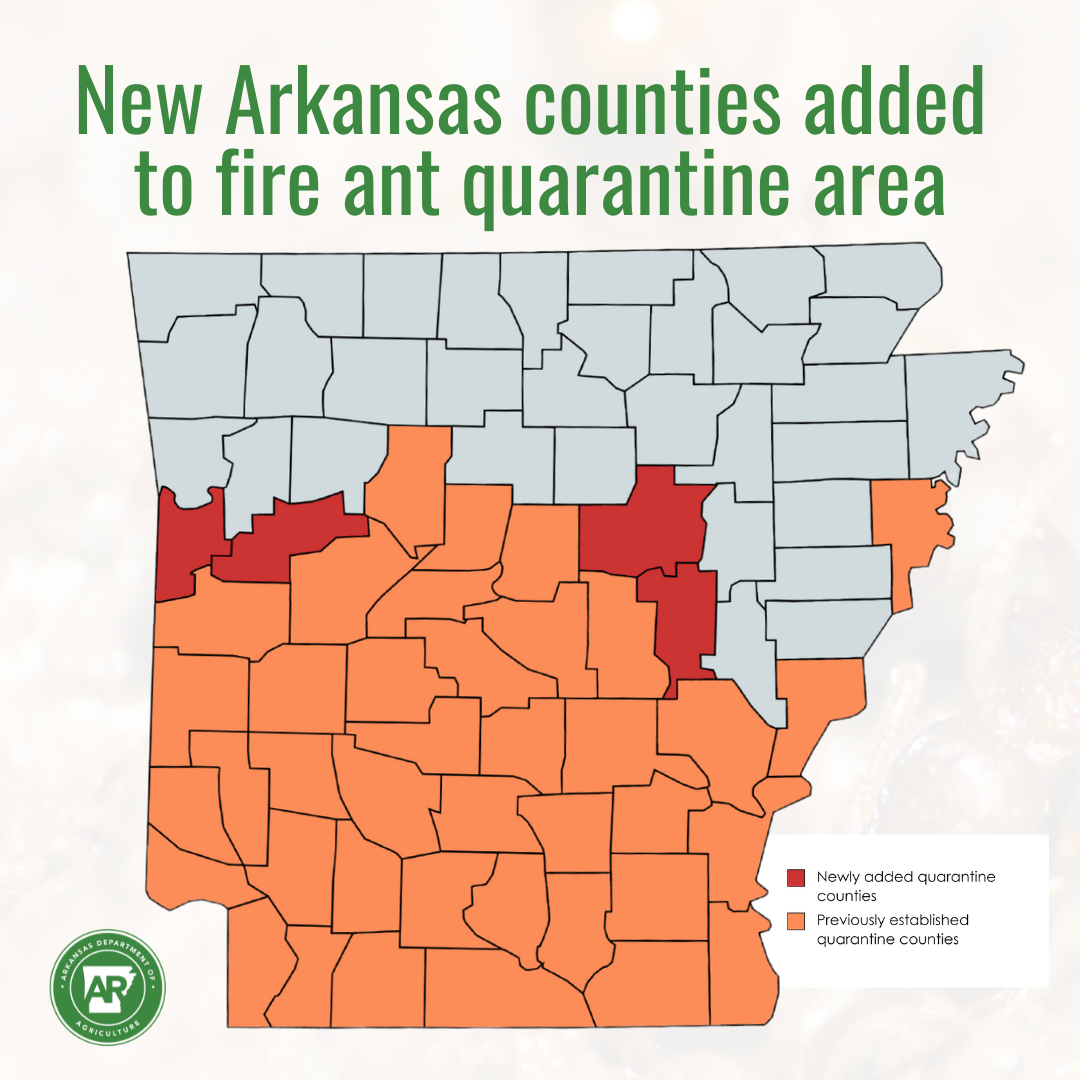Fire ant quarantine in Arkansas expands to four more counties
The federal Imported Fire Ant Quarantine has been extended to four additional counties: Logan, Prairie, Sebastian and White.
July 9, 2021
By Mary Hightower
U of A System Division of Agriculture
Fast facts
- Federal fire ant quarantine area grows in Arkansas
- Quarantine expands in three other states
(290 words)
(Newsrooms: with file art of fire ant https://flic.kr/p/2kE5Y7t and map of quarantine: https://flic.kr/p/2magJjV )
LITTLE ROCK — The federal Imported Fire Ant Quarantine has been extended to four additional counties: Logan, Prairie, Sebastian and White.
“With these additions, there are 43 Arkansas counties included in the current federal quarantine area,” said Kelly Loftin, extension entomologist with the University of Arkansas System Division of Agriculture. Loftin has spent years studying methods for managing these pests and teaching Arkansans how to protect their families, farms and themselves from this invasive species.

Arkansas wasn’t the only state to see an expansion of the quarantine, Loftin said.
“Three counties were added in North Carolina, one in Oklahoma and five in Virginia," he said.
The additions are in response to imported fire ant surveys conducted by state regulators in coordination with the U.S. Department of Agriculture. USDA announced the expansion in June.
“Agriculture is at risk from red imported fire ants for several reasons. These ants will feed on the buds and fruits of numerous crop plants, especially corn, soybeans and okra.” said Paul Shell, plant inspection and quarantine manager for the Arkansas Department of Agriculture. “Large nests located in fields interfere with and damage equipment during cultivation and harvesting.
“Ant attacks inhibit field-worker activities as a single fire ant can sting its target repeatedly,” he said. “Young and newborn animals are especially susceptible to the venom of these stings.”
The quarantine is needed to prevent the artificial movement of these invasive ants to non-infested areas. Movement of regulated items from quarantined to non-quarantined areas is restricted unless specific actions are taken to ensure the regulated items are fire ant free. Regulated items can move freely within the quarantine area. The list of regulated items include:
- Nursery stock with soil or potting media
- Grass sod
- Baled hay stored in contact with the soil
- Baled straw stored in contact with the soil
- Soil
- Used soil-moving equipment.
Find information specific to Arkansas on the fire ant quarantine here: https://www.aphis.usda.gov/aphis/maps/plant-health/ifa-quarantine-mapping.
To learn about extension programs in Arkansas, contact your local Cooperative Extension Service agent or visit www.uaex.uada.edu. Follow us on Twitter and Instagram at @AR_Extension. To learn more about Division of Agriculture research, visit the Arkansas Agricultural Experiment Station website: https://aaes.uark.edu. Follow on Twitter at @ArkAgResearch. To learn more about the Division of Agriculture, visit https://uada.edu/. Follow us on Twitter at @AgInArk.
About the Division of Agriculture
The University of Arkansas System Division of Agriculture’s mission is to strengthen agriculture, communities, and families by connecting trusted research to the adoption of best practices. Through the Agricultural Experiment Station and the Cooperative Extension Service, the Division of Agriculture conducts research and extension work within the nation’s historic land grant education system.
The Division of Agriculture is one of 20 entities within the University of Arkansas System. It has offices in all 75 counties in Arkansas and faculty on five system campuses.
Pursuant to 7 CFR § 15.3, the University of Arkansas System Division of Agriculture offers all its Extension and Research programs and services (including employment) without regard to race, color, sex, national origin, religion, age, disability, marital or veteran status, genetic information, sexual preference, pregnancy or any other legally protected status, and is an equal opportunity institution.
# # #
Media contact: Mary Hightower